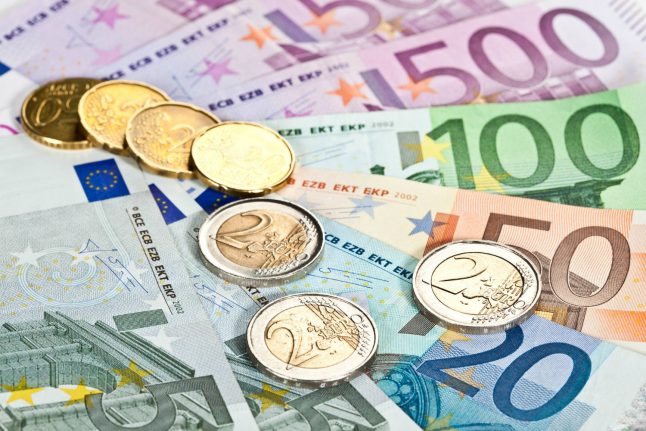The years of economic upturn in Germany appear to be over for the time being. Downturn is the word of the moment as international trade conflicts, a slowdown in world trade, and the Brexit cliffhanger all impact Germany’s economy.
READ ALSO: German blames Brexit and trade wars for failing growth prospects
These global conflicts are striking particularly hard at Germany’s export-oriented industry.
 The Brexit cliffhanger looms particularly large for export-oriented industries. Photo: DPA.
The Brexit cliffhanger looms particularly large for export-oriented industries. Photo: DPA.
According to Uwe Burkert, chief economist of the Landesbank Baden-Wüttemberg (LBBW), “It’s going to be a difficult year. Germany will not be able to escape that.”
Still, there is cause for some optimism for employees, consumers, industry, and banks.
Unemployment to remain low
So far, the labour market has remained strong despite the economic downturn.
The first signs of a downturn appeared recently with the decline in unemployment losing momentum. Large corporations such as BASF, Thyssenkrupp, and Deutsche Bank have all made headlines recently for cutting thousands of jobs.
READ ALSO: Thousands of steel workers protest against German job cuts
 ThyssenKrupp employees protest potential job cuts on December 3, 2019 in Duisburg. Photo: DPA.
ThyssenKrupp employees protest potential job cuts on December 3, 2019 in Duisburg. Photo: DPA.
Regardless, the head of the Federal Employment Agency, Detlef Scheele, is still optimistic: “We assume that it is not a cyclical crisis but a dent.”
According to estimates by experts, the total unemployment rate in 2020 should rise only slightly from 5 percent to 5.1 percent.
READ ALSO: German unemployment at lowest level since reunification
Many companies, especially small and medium-sized firms, are still desperately searching for skilled workers. They have learned to hold on to employees, even in difficult times, with short-time work.
Commerzbank chief economist Jörg Krämer explained: “With the abundant working time accounts [a system in which an employee is able to work longer or shorter hours and collect credits which are later compensated for by additional free time or work] and generous regulations on short-time working allowance, there are effective instruments available” to ensure stable employment.
Consumers will continue to have strong purchasing power
Since the labor market is still somewhat stable, most consumers are not feeling the economic downturn very strongly.
There is comparatively low inflation at the moment, which provides employees with a larger share of the benefits of the recent wage and salary increases. Historically low interest rates are also to thank.
There is no clear expected rise in consumer prices in 2020, and there is no clear sign that the interest rate slump in the eurozone will soon end.
When consumers have more money at their disposal, their purchasing power is also stronger, which in turn boosts overall consumption. According to economists, private consumption will continue to support Europe’s largest economy.
Global conflicts threaten Germany’s export industry
While things are looking mostly stable for employees and consumers, industry in Germany is feeling a strong headwind. The Brexit cliffhanger and international trade disputes are particularly difficult for companies that export many of their products abroad.
As global trade weakens, unsettled customers are holding back on making orders. As industrial companies receive less demand for their goods, production is shut down.
The Federation of German Industries (BDI) expects that industrial production in Germany has shrunk by a total of four percent in 2019.
 Dieter Kempf, the President of the BDI, gives a presentation earlier this year. Photo: DPA.
Dieter Kempf, the President of the BDI, gives a presentation earlier this year. Photo: DPA.
The downturn especially impacts export-oriented key industries such as automotive and mechanical engineering, as well as the electrical and chemical industries, all of which are important to the German economy.
DZ-Bank economist Michael Holstein confirms: “For the coming quarters, it will be crucial whether the international situation actually relaxes a bit.”
Slowing economy: ‘part of a bitter cocktail’
Low-interest-rate banks could be faced with additional problems due to the economic slowdown.
Ulrich Netzer, president of Bavaria’s Savings Bank, recently warned that the economic slowdown will be likely to increase the number of non-performing loans at local banks.
Currently, the banks in Bavaria seem to be performing well.
“But the slowing economy is another ingredient in a bitter cocktail. All of this narrows our leeway to generate sufficient returns,” he said.
All too familiar is the financial crisis in the years after 2008, when many borrowers were unable to repay their loans due to job loss or corporate insolvency.
Translated by Kate Brady.



 Please whitelist us to continue reading.
Please whitelist us to continue reading.
well, nobody saw coronavirus coming in 2020. This article was probably very optimistic